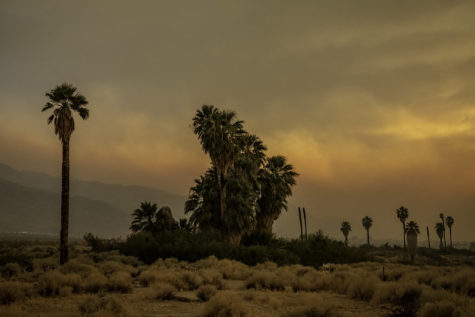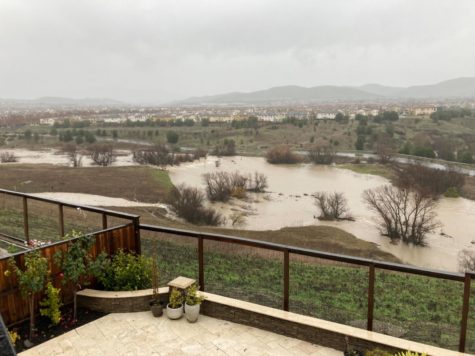New environmental policies of the Trump administration fuel uncertainty for the future
Mere hours after President Donald Trump’s inauguration on Friday, Jan. 20, the Trump administration ordered the Environmental Protection Agency to freeze all affairs and contracts (The Washington Post).
An email detailing the new instructions was sent to the EPA’s Office of Acquisition Management shortly after the 45th president’s inauguration, and was shared with the Washington Post.
“New EPA administration has asked that all contract and grant awards be temporarily suspended, effective immediately,” stated the email. “Until we receive further clarification, which we hope to have soon, please construe this to include task orders and work assignments” (The Washington Post).
According to their website, the EPA gives over $4 billion annually in an effort to support grants and other assistance projects for Native American tribes, non-profit and private profit organizations and states, so the new instructions will undoubtedly have a definite impact on communities throughout the United States, as the sheer amount of money invested in grants indicates substantial reliance upon the agency’s assistance.
According to CNN, four days after the freeze President Donald Trump made another controversial decision and signed executive proposals to encourage authorization of further work on both the Keystone XL and Dakota Access oil pipelines, which was concerning for many environmental justice activists and other opponents of the projects.
Continued construction of both pipelines had previously been halted by efforts of the Obama administration; the former president had refused to approve construction of the Keystone pipeline in 2015, and in the following year, his administration did not provide a permit required for further work on the Dakota Access Pipeline, or DAPL (CNN).
Some have vehemently disapproved of Trump’s actions, expressing concern for the potential environmental consequences and communities that will be affected negatively by the projects.
“The pipelines are all risk and no reward, allowing corporate polluters to transport oil through our country to be sold on the global market, while putting our air and water at serious risk,” explained the president of NextGen Climate, Tom Steyer to CNN.
The representative of the Standing Rock Sioux Tribe, chairman Dave Archambault II, stated, “Americans know this pipeline was unfairly rerouted towards our nation and without our consent. The existing pipeline route risks infringing on our treaty rights, contaminating our water and the water of 17 million Americans downstream” (CNN).
Others, such as Senator Joe Manchin of West Virginia, supported his actions, claiming that construction of the pipelines could provide job opportunities.
“What this country needs is more jobs, and that is why I have always been a proponent of the Keystone XL Pipeline and was an original cosponsor of legislation approving the Keystone XL Pipeline project,” said Manchin (CNN).
The long-term effect of these decisions is not yet known, but many protests have arisen in the wake of the Trump administration’s dramatic policies. According to CNN, several organizations, including 350.org, the Sierra Club, CREDO, and others have already started to plan further protests and resistance movements in response.
“Both pipelines ignited widespread grassroots resistance worldwide, and Trump’s executive orders are renewing mass opposition to the projects,” stated the organizations (CNN).
As the second month of the new year comes to a close, it’s still difficult to define any expectations for the conditions of the environment under Trump’s administration. However, his choice of cabinet nominees is certainly a factor in deciding the future and may be indicative of what’s to come.
President Trump has selected Scott Pruitt as his cabinet representative of the EPA, according to the Huffington Post. Pruitt, a former Oklahoma attorney general, has a long history with the EPA, but previous interactions have not been positive. In 2014, Pruitt challenged the EPA’s Cross State Air Pollution Rule, which, according to the EPA, had the potential to prevent as much as 34,000 premature deaths annually, beginning in 2014.
According to the Huffington Post, the former governor of Texas, Rick Perry, has been chosen to as an administrator for the Department of Energy that manages organizations such as the Advanced Research Projects Agency – Energy. However, according to USA Today, he had claimed he wanted to do away with the department all together in 2011 during a Republican presidential primary debate.
“I will tell you, it is three agencies of government when I get there that are gone: Commerce, Education, and — what’s the third one there?” questioned Perry after briefly forgetting the name of the department (USA Today).
Despite the contentious views of Trump’s cabinet nominees, there is apparently a plan in place for clean energy and other conservation efforts, called “An America First Energy Plan”, according to the White House website.
“The Trump administration is committed to energy policies that lower costs for hardworking Americans and maximize the use of American resources, freeing us from dependence on foreign oil,” reads the description of the plan on the White House website.
The Trump administration also plans to “embrace the shale oil and gas revolution”, but simultaneously claims, “Protecting clean air and clean water, conserving our natural habitats, and preserving our natural reserves and resources will remain a high priority” (White House).
The plan itself seems beneficial, as it will apparently help to provide jobs for American people, as well as continue efforts to maintain unpolluted natural resources, but the future of the environment depends on the whether or not the plan is executed as it is described.
Decisions made by the Trump administration have their fair share of proponents and critics, and only time will determine their effects. However, it is clear that what the future holds in regards to the environment’s welfare seems to be pointed in a very different direction than what the previous Obama administration had intended. While accounting for the actions that have already been taken in the little time that the Trump administration has been active, it is clear that dramatic change seems inevitable, but whether it is for better or for worse cannot be determined as of now.

Taylor joined the Tribune because she has a passion for writing and wants to bring awareness to contemporary environmental issues. She has been in journalism for three years, not including a year in the club....




















